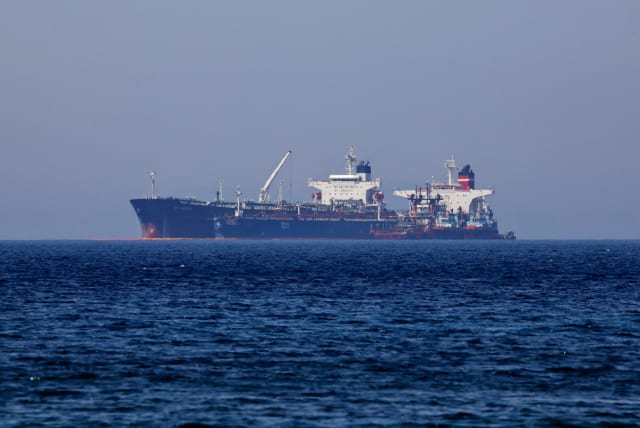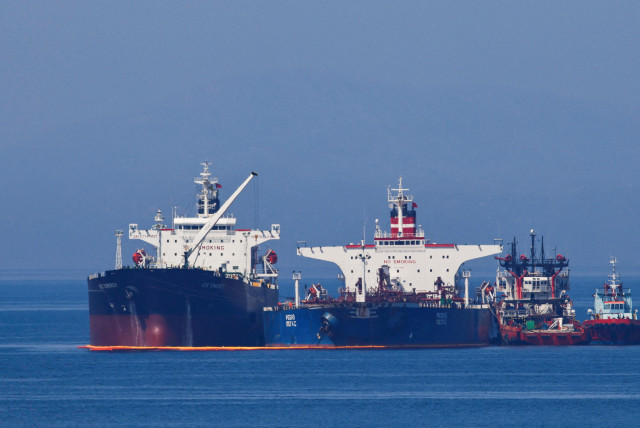US seizes Iranian crude oil linked to IRGC smuggling

The US Justice Department announced on Friday what it said what the “first criminal resolution involving the illicit sale and transport of Iranian oil in violation of US sanctions.”
The US has now seized 980,000 barrels of “contraband crude oil.” The announcement will likely fuel tensions in the Gulf and with Iran, even though the oil was offloaded far away from Iran, from a tanker located in the Gulf of Mexico.
The statement by the Department of Justice says that as of September 8 the US has completed the “successful disruption of a multimillion-dollar shipment of crude oil by the Islamic Revolutionary Guard Corps (IRGC), a designated foreign terrorist organization, that was bound for another country.
This is the first-ever criminal resolution involving a company that violated sanctions by facilitating the illicit sale and transport of Iranian oil and comes in concert with a successful seizure of over 980,000 barrels of contraband crude oil.”
The US alleged that the oil was the center of a scheme involving multiple entities that are connected to the Iranian Revolutionary Guard Corps and the IRGC Quds Force. These terrorist groups, that are part of the Iranian regime, sought to move the oil abroad.
Contraband cargo
“Participants in the scheme attempted to disguise the origin of the oil using ship-to-ship transfers, false automatic identification system reporting, falsified documents and other means,” the US says, according to the statement from the Treasury Department.
The process of interdicting this illicit shipment goes back many months. It involves a tanker called the Suez Rajan. The US says that the in April “Suez Rajan Limited pleaded guilty to conspiring to violate the International Emergency Economic Powers Act (IEEPA).
On that same date, the company was sentenced by US District Court Judge Carl J. Nichols for the District of Columbia to three years of corporate probation and a fine of almost $2.5 million.”
A seizure warrant was issued accusing the ship of carrying contraband cargo. The operating company agreed to cooperate and transport the oil to the US. The ship then sailed to the Gulf of Mexico. The operators incurred “significant expenses associated with the vessel’s voyage to the United States,” the US statement says.
“The contraband cargo is now the subject of a civil forfeiture action in the US District Court for the District of Columbia. The United States’ forfeiture complaint alleges that the oil aboard the vessel is subject to forfeiture based on U.S. terrorism and money laundering statutes.”
The complaint further alleges that the charterer of the vessel used the U.S. financial system to facilitate the transportation of Iranian oil, the US says. The IRGC is a terrorist organization and the oil was being used in money laundering.
“The documents allege that profits from oil sales support the IRGC’s full range of malign activities, including the proliferation of weapons of mass destruction and their means of delivery, support for terrorism and both domestic and international human rights abuses.”
The saga of the Suez Rajan is one of many recent controversies involving Iran’s shipment of oil and also Iran’s attempt to seize ships in the Persian Gulf and Golf of Oman. The US has increased its naval and air force presence in the region to deter the Iranians in recent months. Iran has also pursued another strategy, it has released hostages in order to get money unfrozen.
For instance some $6 billion in assets were held in South Korea and Iran wants that money transferred via a third party back to Iran. Recent reports noted that Iran is optimistic that a recent prisoner deal with the US will lead to it receiving some of those funds. As such the Iranian regime may see the Suez Rajan as a loss, but it has benefited elsewhere.
Iran often does this. In the past when Iranian-linked tankers were seized, such as the tanker Grace 1 which was taken over by UK Royal Marines in 2019; Iran responds by attacking or seizing other ships. In May and June 2019 Iran attacked six ships off the coast of the UAE and n the Gulf of Oman.
It is difficult to track Iran’s network of overseas tanker transfers that may involve its oil exports. For instance the Suez Rajan apparently took on oil near Singapore before it was asked to sail to the Gulf of Mexico, off Texas and be offloaded as part of the court case.
The case has not only spanned this year, but the ship’s journey began back in February 2022. Offloading of the Suez Rajan reportedly began in August, it was unclear why the announcement took place this Friday. In July the US prevented Iran seizing tankers in the Gulf. In August Iran claimed to warn US naval ships in the Persian Gulf.
In August 2020 the US Justice Department announced the “successful disruption of a multimillion dollar fuel shipment by the Islamic Revolutionary Guard Corps (IRGC), a designated foreign terrorist organization, that was bound for Venezuela.”
The US targeted four foreign-flagged oil tankers, including the M/T Bella, the M/T Bering, the M/T Pandi and the M/T Luna. 1.116 million barrels of petroleum was seized.
Jerusalem Post Store
`; document.getElementById("linkPremium").innerHTML = cont; var divWithLink = document.getElementById("premium-link"); if (divWithLink !== null && divWithLink !== 'undefined') { divWithLink.style.border = "solid 1px #cb0f3e"; divWithLink.style.textAlign = "center"; divWithLink.style.marginBottom = "15px"; divWithLink.style.marginTop = "15px"; divWithLink.style.width = "100%"; divWithLink.style.backgroundColor = "#122952"; divWithLink.style.color = "#ffffff"; divWithLink.style.lineHeight = "1.5"; } } (function (v, i) { });

